
We kindly inform you that, as long as the subject affiliation of our 300.000+ articles is in progress, you might get unsufficient or no results on your third level or second level search. In this case, please broaden your search criteria.


Ismail Kadare (i lindur më 1936 në Gjirokastër, në jug të Shqipërisë), pa dyshim është shkrimtari më i rëndësishëm bashkëkohor ballkanas. Saktësisht para pesëdhjetë vitesh, Kadare e kishte botuar “Gjeneralin e ushtrisë së vdekur”, romanin e tij më të njohur.
More...
Në kontekstin e ndërlikuar të letërsisë shqipe të gjysmës së dytë të shekullit XX në të cilin mplekseshin nga njëra anë miti dhe gjuha e tij e pasur asociative e simbolike, me realitetin e ngarkuar politik e historik u shfaqën poetë, të cilët prezantuan në poezinë shqipe përmasën më pak të pranishme në të dhe ndër më të ndërlikuarat, por më ontologjiket për poezinë: të menduarit filozofikisht, relacionet ekzistenciale dhe metafizike.
More...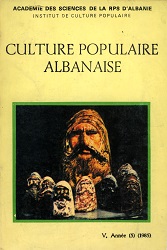
L’épopée de la régions nord-occidentale des Balkans, production artistique d’une civilisation traditionnelle, qui a survécu jusqu’à l’époque de l’industrialisation, a attiré continuellement l’attention des auteurs. Un essor particulier a connu l’étude des problèmes de survivance culturelle de la Péninsule, surtout après la Deuxième Guerre mondiale. Folkloristes, ethnologues, sociologues, esthètes et historiens ont abordé des problèmes les plus divers dans le cadre de la Société internationale des Etudes du Sud Est européen (AIESEE), dans des congrès, conférences et symposiums nationaux et internationaux, ou bien dans des travaux particuliers. Il est parfaitement compréhensible que de telles études ont apporté des contributions importantes en élucidant, avec leurs analyses et leurs déductions, plusieurs des questions traitées.
More...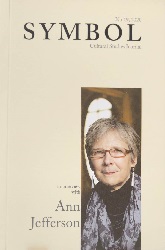
This article analyses the creation, non-communication and communication of Zef Zorba. His creation and non-communication belong to the communist era, while communication has been achieved under democracy. Perceiving Zorba as a hermetist and elitist poet, Shllaku sees the verse as closely bound up with the poet’s destiny and with existentialist philosophy. Accordingly, the piece analyses the craftsmanship of the poet together with the fate and philosophy of his poetry. Finally, the author offers a personal analysis of the work Lips Frozen in Joy [Buzë të ngrira në gaz].
More...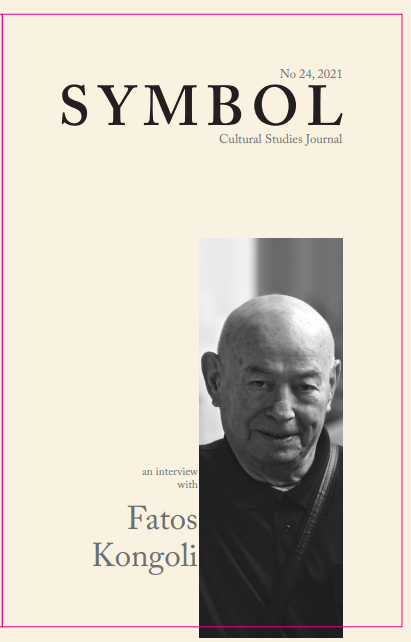
In all Kongoli’s novels there’s the presence of absurd, in the shape of the absurd power of chance, of the written destiny. The absurd derives from the socio-political conditions where there are the characters that are acting. From the circumstance of living under dictatorship – that generates many absurd circumstances – to the circumstances of living in a society under transition. The trauma of characters comes from their confrontation with these circumstances of hypothetical realities.
More...
In Kongoli’s novels there is a main character at the center, around whom all the questions of the action revolve. But in addition to this main character, there are a number of other characters who act, speak, establish various connections and relationships, become actors in the events, and thus assume certain functions within the narrative. Kongoli’s characters become executioners of themselves, they can not see the beautiful face of the world, but only find it by going back in time, through childish retrospection.
More...
Marin Barleti remains true to the humanist notion that everything useful is also beautiful: mankind and human potential are beautiful and useful for Barleti; the man and the power of his words are reinforced by the strength of Barleti’s heart and words, and it is precisely there that we also find the source of the metaphysics and transcendence of the work that elevate his style.
More...
Multiculturalism also requires multilingualism. For example, Albanians from Kosovo are overwhelmed with the foreign preposition multi; they have a multi-ethnic state, a multilingual constitution, a multicultural society etc. While multilingualism has been considered a challenge of communication for a long time, now, in Albanian literature, it can be considered a form of communication. And in our literature also as a form of creation.
More...
This paper deals with the work of the one of the most important writers of the first part of the twentieth century, about Miloš Nikolić, who has usually been signing his works using pseudonym Miđeni. Miloš Nikolić was born in Serbian Orthodox family during the rule of the Ottoman Empire in the village Vraka near Skadar, in 1911. He was educated in Serbian language from Primary School and High School to the School of Theology. At the early age he lost both of his parents and guardians and because of that he received scholarship from the Yugoslav government. He wrote his first works in Serbian and Russian language in school. Later in life, he published all of his works of poetry and fiction in Albanian language. His works have been published twice in Serbo-Croatian language, both in Priština and Belgrade. This year, for the first time, we are publishing the book of short stories, translated from Albanian language to Serbian language, to commemorate eighty years since Miloš Nikolić passed away.
More...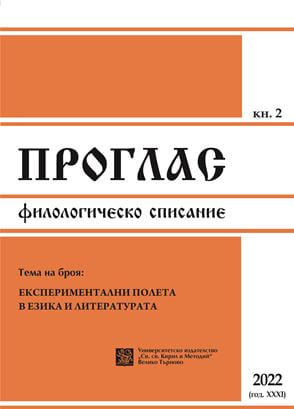
The present paper examines a specific issue from the field of translation reception of the Balkan litera¬tures, which is an essential part of the comparative Balkan Literary Studies. The study is based on the important role of the translations for the exchange of ideas and messages between different cultures. The processes of translation reception of the works (novels, novelettes, essays and memoirs) of the world-re¬nown Albanian writer Ismail Kadare in two Balkan cultures – the Bulgarian and the Romanian – are being studied. Parallels and differences are being looked for, regarding the chronology of the appearance of the translations, the key role of the translator, working with Albanian (Marina Marinova in Bulgaria and Marius Dobrescu in Romania), the socio-political factors, influencing the reception, etc.
More...
The article presents two experimental and dystopian novels of the young Kosovar author Artrit Bytyçi. “The Arbiter” plays in 2049 and describes an android robot entering Kosovo from totalitarian Albania with the mission to kill liberal journalists in Prishtinopolis. “Arnautistan Noir” is a detective story in form of a comic describing Prizren as if it were still under Ottoman rule. By using the technique of alternative and counterfactual history, Bytyçi ironically plays with sacrosanct national narratives. The League of Prizren 1878 is still the time icon of the Albanian “rebirth” and national movement. The common thread of both novels is the recalibration of what it means to be Albanian since the 2000s including the demonopolization of Tirana as its political and cultural centre. Bytyçi’s own biography stresses the importance of the highly-educated diaspora in shaping modern and plural Albanian identities.
More...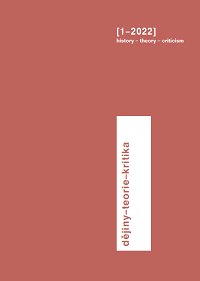
The article aims to show how the Albania of the future was imaged through the science fiction literature published in the country in the 1970s and 1980s, which was the “golden age” of this genre in Albania. Science fiction was considered to be a part of children’s and young adult literature that supplemented science education. Although the writers could envision what their country would look like in the next decades or centuries, they had to ground their imagination in sound scientific data, and they had to keep in mind the political realities of the present. Albanian science fiction literature reflected the fact that Stalinist Albania was one of the most isolated countries on the planet. Albania projected into the future was expected to be a highly developed country, whose spaceships, guided by pioneers, explored the universe, but at the same time it was vigilantly protecting its borders against capitalist and socialist revisionist states. Unlike what happened in other socialist countries in the post-Stalinist period, science fiction in Albania could not function as a subtle critique of reality and the Cold War. On the contrary, it served to limit the political horizon within which the children would grow up: while the imagined Albania of the future allegedly offered them limitless possibilities in technical and scientific achievements, they had to live in the same “frozen” socio-political system as in the present.
More...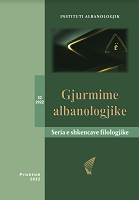
Review of: Shefkije Islamaj, Ligjërimi, gjuha dhe stili në krijimtarinë letrare moderne dhe postmoderne të Rexhep Qosjes, Prishtinë, 2021, 827 f.
More...
Review of: Shpresa Ismajli Aliu, Veçori leksikore dhe stilistike në romanet e Rexhep Qosjes, Instituti Albanologjik, Prishtinë, 2021, 332 f.
More...
Prof. Tito Jochalas është një emër i mirënjohur në studimet albanologjike. Ka kryer studimet e larta filologjike në Universitetin e Athinës (1965). Punoi në fillim si lektor i gjuhës greke në Universitetin e Palermos, ku u njoh me mjedisin arbëresh. Më 1970 kreu studimet në fushën e albanologjisë në Universitetin e Mynihut pranë prof. M. Camajt për gjuhë shqipe dhe prof. G. Stadtmüller-it për histori ballkanike. Më 1971 filloi punën në Akademinë e Shkencave në Athinës, ku për 35 vjet drejtoi sektorin për neologjizmat dhe terminologjinë e gjuhës greke. Krahas kësaj ishte edhe drejtor i Institutit të Studimeve të Europës Juglindore në Athinë. Në fushën e albanologjisë T. Jochalas ka botuar një varg librash dhe dhjetëra artikuj. Ai është një filolog i rysur në fushën e studimeve për Arvanitët dhe për ligjërimet e tyre.
More...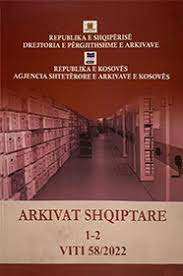
Rexhep Qosja is among the few rare contemporary intellectuals who has expressed a clear interest in dealing with almost everything related to language, history, literature, art, the history of literature, journalism and other fields of Albanian culture. In whatever field he’s applied himself, with the exception of poetry, he has left an indelible mark. It is interesting that the question of archives and archivists, like no other personality, has not escaped the interest of Professor Qosja. In his latest omnibus novel Të fshehtat e treguara, published in 2020, the archive and archivists have a central role. His perspective on this institution, in particular some of his thoughts regarding the archive and also archivists, are special not only as judgment formulations, which meanwhile have a significant importance for the truth about and for archives and archivists respectively. Consequently, I believe that these facts need to be highlighted for several essential reasons, but I would single out two of them in particular: First, to make us, who work in archives, more aware of the importance of the work we do; and, second, to draw the attention of others to the importance and function of the true mission that archives have. Something like this has not been written before, in any literary work, not only in Albanian literature, but, as far as I know, not even in any other literature of the different peoples of Europe and the world. Therefore, it is clearly necessary to point out some aspects of his attitudes (at least literary) about the institution of archives, because Professor Qosja, in this case, has devoted almost an entire work to the truth about archives and the importance that they have them essentially as institutions of the memory of a country, a state or a nation. The analysis and highlighting of what the author Qosja has written in this novel about the archives is something extremely important for another reason, however. We all, although we live in the century XXI, when it comes to archives, although we may not like it, we need to admit that we have many gaps, the elimination of which would mark a standard that would enable the completion and proper functioning of these institutions that are treated as institutions of special importance in almost every serious country.
More...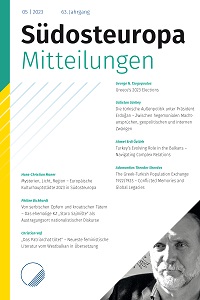
The article presents new books written by Lana Bastašić (Bosnia and Hercegovina), Lindita Arapi (Albania) and Rumena Bužarovska (North Macedonia). Two of them are transnational authors who have left the Balkans. All three authors describe domestic violence, sexual abuse and oppression in different regional contexts. Only Bastašić writes about ethnic conflicts during the Yugoslav wars of the 1990s, whereas the Albanian case seems conditioned by totalitarian spying and the social pressure of extended families. How do the authors position themselves in the asymmetrical and hierarchical relationship between the Balkans and the West? Despite their realistic descriptions of the Balkan patriarchy, they are aware of existing mutual hetero stereotyping and actively decide against a one-sided position. Especially Bužarovska’s and Arapi’s books avoid being labeled as supporters of Balkan-related orientalism. At the same time they oppose occidentalist and anti-Western currents in the Western Balkans.
More...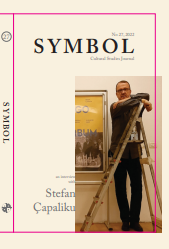
In this study, Robert Elsie writes about Kosovo, its culture, and literature by giving impressions on this country and time. Thus, he describes this country’s political and cultural context and tries to find the distinctive signs of the Kosovar identity related nationally to the Albanian identity but politically separated from it.
More...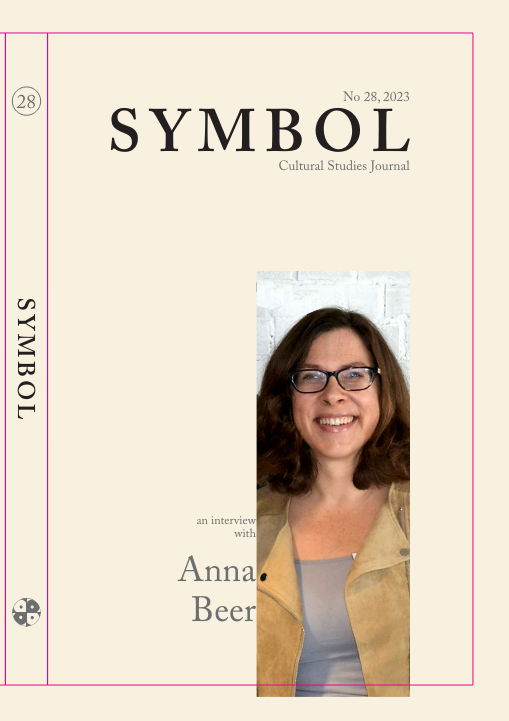
In this paper, Robert Elsie has made an overview of Albanian literature from the beginning to the end of the 20th century. This is mainly an evidence of the birth, development, and transformation of literature throughout five centuries, mentioning and commenting the most important authors and works.
More...